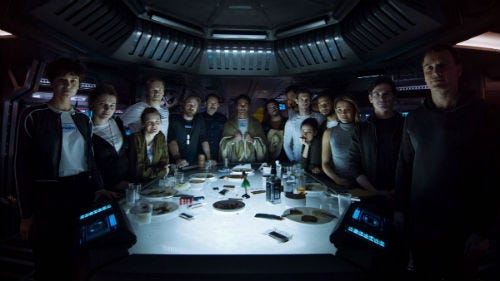Alien: Covenant
Say what you will about “Prometheus” (and I have a lot to say about it, rarely good), but Ridley Scott's 2012 prequel to “Alien” tried to build something new from the mystery of the original entry. Filled with oedipal issues, mystique, gore and insanity, that movie at least failed on its own terms — a daring, if broken, reboot of a classic franchise.
And then there's “Alien: Covenant.” Five years later, lacking even the basic courage to title it without franchise denotation, we get a C-grade sequel to an A-grade flop. “Covenant” is everything you'd expect from an "Alien" prequel with scant attempts at adding something new. Where it does succeed are moments that feel spliced in from another, more interesting movie. Alas, alas, that more interesting movie is just “Prometheus.”

Set 10 years after the disappearance of the Prometheus and its crew, the colony ship Covenant picks up a distress call from a mysterious planet. Acting captain Oram (Billy Crudup) chooses to investigate over strong-willed second mate Daniels (Katherine Waterston). Daniels lost her husband in an accident; in her grief she befriends Walter (Michael Fassbender), a newer model of the conflicted android from the first film, David.
The crew, with plenty of redshirts in tow, lands on the new planet and is immediately beset by monsters that look like the original Xenomorphs. Things take another turn when they are saved by David, the sole survivor of the original Prometheus exhibition. He takes them to his "dire necropolis," a Pompeii-like disaster zone that was once a city of Engineers, the creatures from “Prometheus” who created Man.
David and Walter are the stars of the show. Fassbender, as with “Prometheus,” steals it, creating two characters whose differences underscore the themes of creation that Scott finds so delicious and powerful. At their best, “Prometheus” and “Covenant” echo Scott's masterpiece, “Blade Runner,” serving as thematic sequels to Roy Batty's tragic existential crisis. David is among his most enduring creations.
David's home, his menagerie, his perversity and madness is equal parts cheesy B-horror and brilliant. Unfortunately those scenes are the minority of the film, and by the third act we end up in standard "Alien" territory. Not helpful is the blandness of the Covenant crew. The caveat of this particular doomed voyage is that the crew is made up of couples (straight, LGBTQ, and mixed-race, at least) as a form of Noah's Ark.
For a colony ship it is conceptually interesting, and Oram in particular serves as a voice of faith that is neither celebrated or critiqued. But their diversity and perspectives are a narrative dead-end, wasted potential. There's no tension to their gory deaths, and boy are they gory; most of them are so outlandishly violent as to be off-putting, in line with “Alien vs. Predator: Requiem” rather than “Alien” or “Aliens.” It's as though Fox told Scott he could have his mad science mumbo-jumbo if he gave them a conventional “Alien” entry for the masses. His heart isn't in it — and it just feels that way.
Perhaps the problem with "Covenant" is that it lacks the subtle majesty of the three best entries of the franchise. "Alien," "Aliens," and the deeply flawed "Alien3" all operate in dark spaces and utilitarian places. The Alien beast is a monster under the bed, that thing that hides in a dark basement. Throwing it into the daylight diminishes it and makes it seem goofy and weird. The David material could drive a subtle, weird, creepy story. It has nothing to work with here.
After “Alien vs. Predator” in 2004, James Cameron declared “Alien” a dead franchise. It was diluted, worn out. “Prometheus” tried. Like its namesake, it was punished for its ambitions — but it at least had some motivation. After "Covenant," perhaps this franchise never will again.
